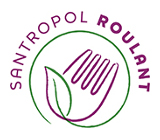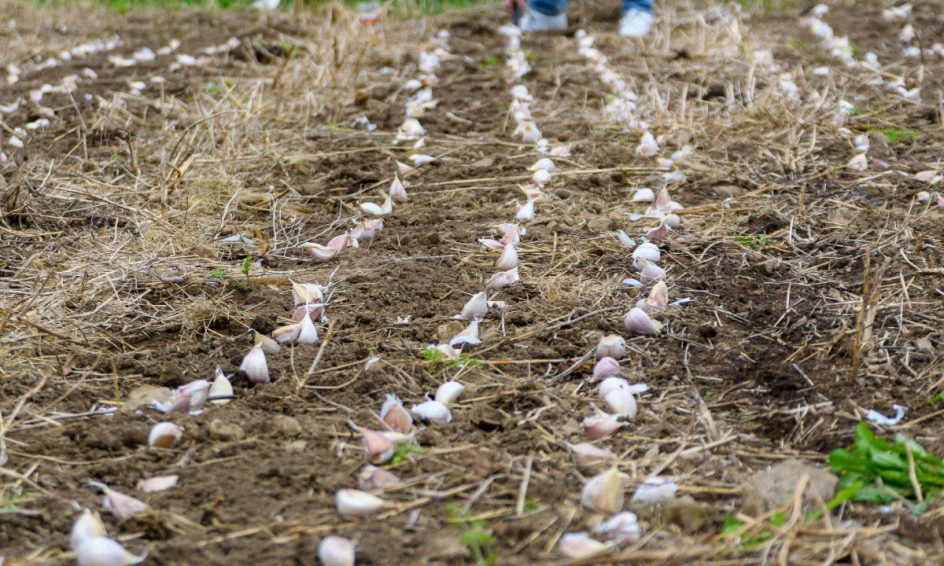After landing on a sunflower, the round, scarlet ladybugs eats hundreds of aphids, which would otherwise suck the sap from the plants until the plant dies. The leaf beetle, with its yellow and black striped body, settles comfortably in a squash flower, plotting a plan to eat what would normally have fed our long awaited cucurbit.
Since 2012, the Ferme du Roulant and the Roulant’s rooftop gardens have been certified organic by Ecocert Canada. Producing fresh, local vegetables for the community while regenerating the soil and treating the earth as our neighbour has always been and will continue to be a central focus of the Roulant’s agricultural programs.
But what does it really mean to be certified? What are the ladybugs and the leaf beetles? (read pros and cons😉) What avenues of reflection do these findings generate? Let’s get started!
Let’s start with a definition:
- According to Ecocert, organic certification is “a rigorous process that consists of an independent and impartial assessment of the conformity of a product, service or system with the environmental and social requirements specified in a specification or standard.”
What the certification process involves at the Roulant:
- Documentation of all stages of production to ensure traceability of each crop from seed to sale
- Apply only certified organic products in the fields and gardens (with some exceptions)
- An annual inspection
- Where necessary, one or more follow-ups for non-conformity
- An annual fee of $850 for the farm and $160 for urban agriculture
The Ladybugs of Organic Certification (pros) 🐞
- Being part of the Réseau des Fermiers de Famille
The Réseau des Fermiers de Famille is a solidarity network of market gardeners that offers a platform for visibility and sales through which the Roulant farm has been selling its organic baskets for several years. All the farms that are part of it are certified or in the process of being certified.
- Access to more grants
The Ministère de l’Agricultures, des Pêcheries et de l’Alimentation (MAPAQ) provides equipment grants to farms to encourage organic choices. If the Ferme du Roulant was not certified, funding for certain materials – such as nets, tarps, and weed control tools – would drop from 90% to 70%.
- Consumer confidence
By having an external body confirm that we have organic practices (according to their criteria), we gain trust more quickly among potential basket members.
The Leaf Beetles of Organic Certification (cons) 🚧
- Green-washing
Despite the hard work to gain recognition from the impact-conscious farming community, organic certification has become something of a ‘super-brand’. Like ‘free range’, these labels do not always guarantee that products align with our values. One product may be certified organic but have atrocious employment practices, and another product may align with our values, or even be organic, without being certified. In this article on trust in the French organic logo, it is explained that certifications ‘guarantee compliance with a specification, not results […]. Similarly, there are no requirements regarding the reduction of GHG emissions or the water footprint. It is therefore perfectly possible to grow plants in a greenhouse in an arid region and transport them by plane before stamping them ”organic” […].
The good news is that, beyond labels, one of the best ways to confirm alignment with them is to strengthen our ties with our producers and learn about their practices. #farmersmarkets!
- Time and energy
At the Roulant, program managers, management, and accounting dedicate dozens of hours and energy to certification each year. These hours can easily multiply when a non-compliance arises. Take the recent example of straw: the severe heat waves of the last two years have made it difficult to access certified straw. We had to find alternatives which, at the time of inspection, were seen as non-conformities, jeopardising the certification and adding great pressure to the team. Several calls, emails and sweats later, and despite the resolution, we are left with the question: what if this energy had been dedicated to the fields or to our educational programs?
- Declining donations
It often happens, especially in the Urban Agriculture program, that we have to decline donations because they do not comply with the certification. For example, a neighbour wants to give us seeds that she has saved herself in a garden she has been growing for 5 years. Accepting them is stressful, as there is no paper proof that they have not been sprayed. For us, the social and ultra-local impact here seems greater than the risk of chemical residues.
- A privilege to reconsider?
Being certified organic is not always accessible. We are privileged at the Roulant to be able to dedicate human, financial, and administrative resources to certification. Some small-scale farms have excellent environmental and social practices, but do not comply with certification, or cannot access it. Could the choice not to be certified organic be a gesture of solidarity with small-scale producers who have practices aligned with our values, but who cannot access certification?
Avenues for Reflection 🛣️
- For small producers who cannot afford to be certified, it would be possible for producers not to bear the costs of certification. The bill could be passed on to consumers, as in the case of the Family Farmers’ subscription. With the purchase of an organic basket, subscribers pay $18, which funds the network. However, this way of covering costs risks increasing the price of organic vegetables/fruits, which are already less accessible;
- The inspiring case of Denmark: the Danish government is paying the cost of organic certification with the aim of being the first European country to have 100% organic agriculture within the next decade;
- Many ladybugs: certification will have put us into the routine of good documentation and traceability practices. The decades of work of the farming community is certainly not to be thrown out the window;
- No environmental justice without social justice.
Could organic certification be diverting our energy from important issues like social justice, or access to healthy food for all? Not necessarily an argument against organic certification, but an important reminder that more systemic concerns about food access need to be addressed. Stay tuned for a future agricultural column in the newsletter!
- To add complexity 🔥 the case of USDA certifying hydroponics and confined livestock, Real Organic offers an additional certification
Fortunately, in Quebec, organic certification of soilless crops (not linked to the subsoil and bedrock), including hydroponics, is still prohibited. But in the United States, the situation is different and is causing a stir. “The outcome is that real organic farmers are going out of business, and real organic customers are being deceived on a regular basis. The choice of buying real organic food in the stores is being lost. How can you tell the pasture-raised milk from the confinement operation? How can you tell the soil grown berries and produce from the hydroponics?”
Real Organic is an initiative led by Leah Penniman, Jean-Martin Fortier, and Vandana Shiva, three individuals who are pillars of environmental and food justice in North America and who are much admired at the Roulant. The initiative features an additional certification that distinguishes field-grown and pastured livestock within the USDA Organic certification.
Conclusion
The purpose of this series of blog posts is to open small windows into the behind-the-scenes of the Roulant. We want to bring our certainties and uncertainties to the surface and share them with our community so that together we can continue to learn.
This week we are perhaps asking more questions than we are providing answers, in a field in which we are sometimes considered a reference organisation. Working in social change nevertheless requires us to constantly question what we have learned and to put ourselves in a position of discomfort in order to innovate, progress and learn.
So we invite you to reflect on this with us, apple in hand, and to continue to support your local organic farmers, certified and non-certified.
Magali
Do you have a comment or an opinion? Please let us know at feedback@santropolroulant.org.

